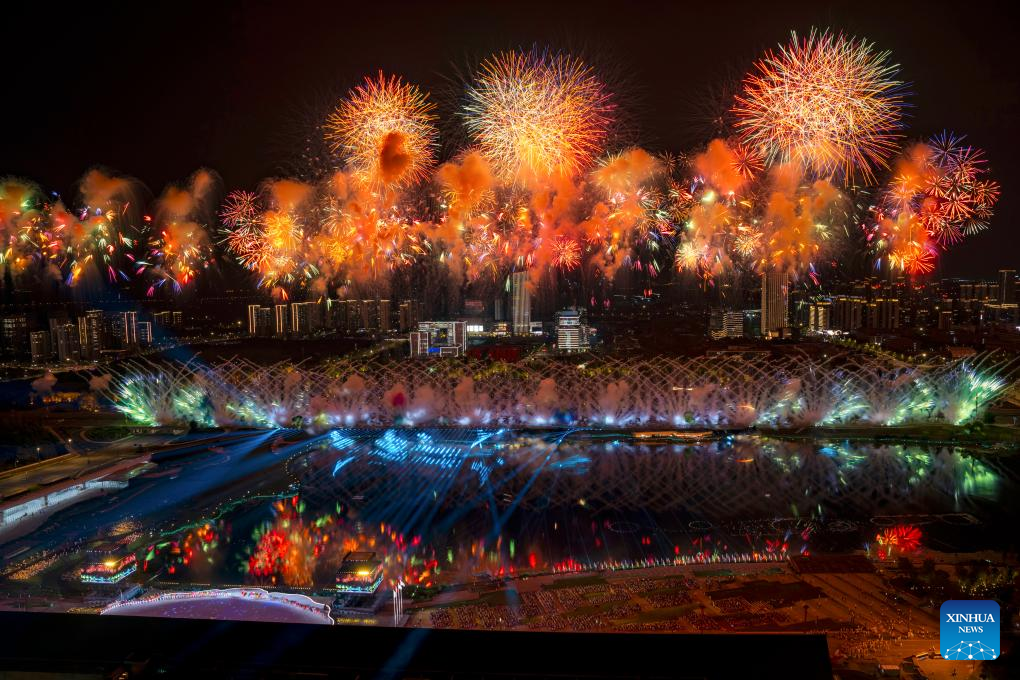


Fireworks are seen during the opening ceremony of the World Games 2025 in Chengdu, southwest China's Sichuan Province, on Aug. 7, 2025. (Xinhua Photo)
On August 7, the 12th World Games opened in Chengdu. This marks the first time the Chinese mainland has hosted the event since its inception in 1981, and represents another high-level comprehensive international sports competition held in China following the Nanjing Youth Olympics, Beijing Winter Olympics, and Hangzhou Asian Games.
Sports carry the dream of national prosperity and rejuvenation. Accelerating the building of China into a leading sporting nation is a crucial task in the reform and development of China's sports industry in the new era. Hosting high-level sports events not only directly tests the progress of competitive sports, but also helps drive the comprehensive growth of mass sports and the sports industry, meeting the people's aspirations for a better life.
As an international multi-sport event, the World Games primarily features non-Olympic sports, representing the highest level of competition in those disciplines. It complements and mutually reinforces the Olympic Games. This edition of the World Games includes 34 official sports, 60 disciplines, and 256 events. Sports like billiards, dancesport, cheerleading, flying disc, tug of war, and orienteering are distinctive, combining strong competitiveness with high entertainment value. Widely popular in daily life, they serve as important platforms for promoting national fitness and mass sports.
Furthermore, dragon boat racing and wushu (martial arts), beloved by the Chinese public, have been included as official events for the first time. This provides a valuable opportunity to fully showcase the unique charm of China's excellent traditional culture and actively promote the global dissemination of dragon boat racing and wushu culture.
Recently, China marked the 30th anniversary of its first national fitness program, the "National Fitness Program Outline”. Over time, China's national fitness campaign has achieved remarkable results. Especially since the 18th National Congress of the Communist Party of China, national fitness has been elevated to a national strategy. Guided by high-profile events like the Beijing Winter Olympics and Hangzhou Asian Games, the values of national fitness have taken deeper roots among the people.
The public service system for national fitness has continuously improved, sports facilities have become more accessible and equitable, and a mass sports event system is gradually taking shape. By the end of 2024, China had 4.8417 million sports venues, with per capita sports area reaching 3.0 square meters, laying a solid foundation for the high-quality development of national fitness.
Currently, the sports industry is rapidly growing into one of the pillar industries of the national economy. Results from the 5th national economic census show that in 2023, the total output value of China's sports industry reached nearly 3.7 trillion yuan, with an added value of approximately 1.5 trillion yuan, accounting for 1.15% of GDP. Against this backdrop, China's sports economy is exhibiting multi-dimensional growth, with winter sports, outdoor activities, and sports equipment manufacturing and sales all experiencing rapid expansion.
In recent years, Chengdu has successfully hosted high-profile international sporting events including the 31st FISU World University Games, the Thomas & Uber Cup (Badminton World Team Championships), the ITTF Mixed Team World Cup, and the WDSF Breaking World Championships. These events have significantly enhanced Chengdu's international profile and influence, taking solid steps towards building a world-renowned city for major events.
Data shows that ticket revenue during the 2024 Thomas & Uber Cup exceeded 50 million yuan, generating a direct economic benefit of 540 million yuan. The 2024 ITTF Mixed Team World Cup generated ticket revenue of 45 million yuan, stimulating consumption worth 380 million yuan. From the University Games to the World Games, the multiplier effect and spillover effects of Chengdu's events economy are becoming increasingly evident.
The World Games is not only a platform for athletic competition, but also a stage for cultural exchange. During the Games, a rich array of cultural exchange activities attracted significant attention. From the "Bamboo Dream" torch and "Bamboo Light" medals to the mascots "Shubao" (representing the treasure of Sichuan) and "Jinzai" (representing the essence of Sichuan Brocade), the Chengdu World Games cleverly integrated uniquely regional design elements like giant pandas, golden snub-nosed monkeys, and Shu brocade.
The designs, embodying the themes of "Chasing Dreams" and "Chasing Light," vividly express the sporting spirit of transcending limits and harmonious coexistence, echoing the Games' theme of "Boundless Sports, Countless Wonders." "Traveling with the Games" – the Chengdu World Games offers not only thrilling competitions, but also allows athletes and global audiences to personally experience the beauty of the natural ecology and the rich cultural heritage of the ancient Shu civilization.
Contributed by Li Jingbo, associate professor in Shandong Sport University
Translated by Zhang Zhou
点击右上角![]() 微信好友
微信好友
 朋友圈
朋友圈

请使用浏览器分享功能进行分享
